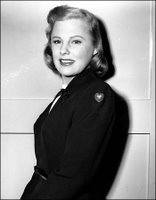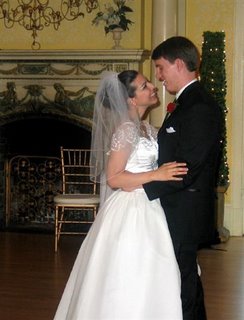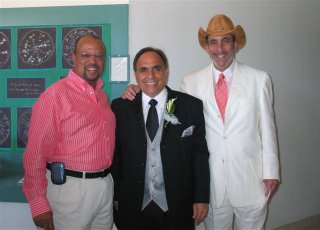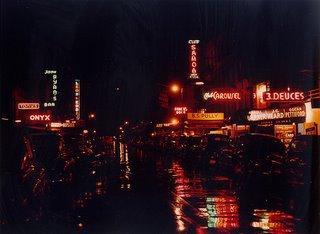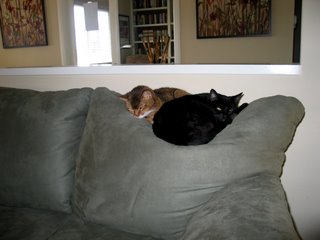
On Friday night, October 4, 1968, I had an experience that changed my life.
I went to the movies.
Tonight I'm thinking about that night. It was 38 years ago, and I was a few days shy of 13, as tonight I'm a few shy of 51. How many of us get to have a life-changing experience before turning 13? I don't know, but I did.
Sure, I’d been to the movies plenty of times. What kid growing up in the 1960s didn’t go to the movies a lot? But it was on that Friday, a week ahead of my 13th birthday, that I saw Stanley Kubrick’s 2001: A Space Odyssey for the first time.
How bowled over was I by the experience of this film, that last week that I would be 12 years old?
This bowled over: It was the closest thing I’d ever had, up to that point in my life, to a religious experience.
After 38 years it remains so.
The setting was the Garland Theater in Spokane, Washington, which in those days was a Cinerama theater. To anyone who has seen this film on their home screen, even if we’re talking about 40 inches worth of flat-screen plasma, I have to tell you that there was nothing to compare to seeing it in Cinerama. The cutting-edge moviegoing experience of that era, (and short-lived thanks to its cost) Cinerama used a then-revolutionary three-camera technique to create a screen image so wide that it actually went partially around the audience, creating a you-are-there effect that was simply incredible. The films that were shot in Cinerama, including How The West Was Won, Lawrence of Arabia, Dr. Zhivago, The Sand Pebbles and 2001 used Cinerama to full effect. No one who ever saw one of these, or the handful of other films that were made in Cinerama before the technique was scrapped, will ever forget the experience.
In the case of 2001, there I was, in space, confronting the enormity of the universe and the familiar yet-so-alien sun in the distance, Richard Strauss’ music from Also Sprach Zarathustra bathing the whole thing in a sunrise-glow of C-major affirmation, ironically raising the curtain on a world that, before the film was over, would be many light-years away from the homey, familiar reassurance of C-major.
I went home from the movies that night in the grip of an unfamiliar emotion: awe.
2001 was, and remains, unique. Nothing like it had ever been made before, and no one who wasn’t around back then will appreciate the furor it stirred up when it left many of its early audiences scratching their heads or worse. Some, actually angered by a movie that did not cater to their accustomed notions of plot, dialogue and character development, demanded their money back. The film’s Hollywood premiere, while no rival in the scandal department to that which attended the 1913 Paris premiere of Stravinsky’s Rite of Spring, nevertheless saw its share of controversy. Rock Hudson famously got up and walked out of the premiere, muttering “Will someone tell me what the hell this is about?”
His confusion was not entirely unjustified. 2001 tells its story in a manner heavily visual and hardly verbal at all. In fact the film’s first spoken words occur about 45 minutes after the opening credits. To puzzle it out, a viewer has to be able to recognize and intuit visual clues, something movie audiences of 1968 were not used to, and in fact movie audiences of 2006 would probably have the same problems. It is, admittedly, a problematical film in some ways, and speaking for myself, I had to see it several times, read the novel based on the script and do a great deal of reading about the film before it all made sense to me.
So what was the attraction of this $10.5 million visual enigma to a boy on the eve of his 13th birthday?
Like many boys who grew up in the era of Project Gemini, Project Apollo and the race to the moon, I was utterly infatuated with the romance of space. I wanted to be an astronaut. So did many of my friends. We would greedily glom on to any book, magazine, TV show or movie that had anything to do with space. When we learned, earlier that year, that a big movie with the words “space odyssey” and the odd-sounding but highly intriguing year “2001” in its title was about to come out, we were of one unanimous conviction (never mind that none of us quite knew what the word “odyssey” meant): we had to see this picture.
What was I expecting when I went into the theater that night? I really don’t remember, but certainly nothing like what I got. Amongst ourselves we had established that the film had something to do with life in the future, hence the “2001” of the title, and we knew that it was also going to have something to do with rocket ships. That was all any of us knew or cared about.
I used the term “religious experience” above. Actually, when the film had just been completed, (and it was among the most expensive movies ever made up to that time) Arthur C. Clarke, who had written the short story upon which the movie was based and had collaborated on the screenplay, joked that MGM didn’t know it, but the studio had just “made the first $10 million religious movie.” Clarke, an atheist, thought he was being ironic.
The plot’s main premise gave rise to Clarke’s joke, though, and for those who asked “What was it?” about the famous black monolith in the film but never waited around for an answer, here’s the skinny:
The premise of 2001 was that an ancient civilization from elsewhere in the universe, never identified or even seen but obviously way ahead of ours, was aware, four million years ago, that the primitive ancestors of human beings, the “man-apes” of the African veldt, were on the verge of extinction. Knowing that if these hairy hominids are allowed to die off there will be no human history, they decide to save us. The black monolith is the artifact they mysteriously place on earth. It somehow communicates the idea to the starving man-apes that they can use bones for weapons. They do so, first killing animals for food and then vanquishing a rival tribe of apes that’s monopolizing their water supply. Our ancestors have been taught how to use primitive weapons. Tools will come next. The apes and their descendants – us – are saved.
Then comes the famous scene when one of the apes throws a bone high into the air and, spinning, it suddenly turns into a spaceship – the fastest four million-year leap in film history.
In the film it’s 2001 now, and another one of these black monoliths turns up on the moon, which has of course been colonized. (In the late 1960s, with manned space exploration proceeding by giant, televised leaps, many expected that there would be American, and probably Soviet moon bases by 2001.) Scientists on the moon dig the thing up, quickly ascertain that it was not put there by any natural process, and are of course astounded as well as puzzled. What was it, they wondered along with the audience? Why was it there?
It was ‘The Sentinel’ from Clarke’s original story of that title. The ancient aliens who saved us from extinction knew that sooner or later we would reach our own moon. They planted a second monolith there as a kind of alarm system, which is the reason that second monolith, at the end of the film’s Clavius sequence, suddenly shocks everyone by emitting a blast of earsplitting radio noise at Jupiter. The implied message is that there is some invisible nexus in the neighborhood of Jupiter through which our cosmic saviors can receive information. The radio blast from the monolith is to alert them that mankind has found and dug up that thing, and that soon someone from earth will be heading for Jupiter, seeking what’s on the other end of that radio signal.
Sure enough, we humans being the curious creatures that we are, 18 months later the spacecraft Discovery I, with a crew including astronauts Dave Bowman and Frank Poole (Keir Dullea and Gary Lockwood) is on its way to Jupiter in search of what that radio-shriek was all about.
The rest we know: Bowman, the only astronaut left after the somewhat-unbalanced computer HAL tries to eliminate the crew, whom he sees as jeopardizing the mission, ends up passing through that space-nexus himself (the famous “light show” that the era's hippies enjoyed so much after dropping acid) and ends up being assimilated into the ancient cosmic civilization himself after dying a symbolic death in the eerie “white hotel suite” sequence at the end of the film. The “star-baby” seen orbiting Earth at the movie’s close is Bowman, reborn.
When Clarke called this film “religious,” he thought he was making a funny. But when I came to understand the film’s real story, I understood why I went home from the movies that night feeling so shook. The fact that I was not quite 13 notwithstanding, there was a mind-expanding aspect to the movie that should have had a similar effect on any sensitive individual who experienced it.
But I wasn't just a sensitive individual. I was a child. How does a 13 year-old deal with awe? Many years later I saw a “Bloom County” cartoon that illustrated my post-2001 dilemma perfectly. Oliver Wendell Jones, the precocious, baldheaded little black kid with the thick glasses, is up on his roof late at night with his telescope, gazing out at the stars. As he does so, he reflects on the infinity of space, how it goes on and on and on and on and on and on…in the final panel, he’s sitting at the kitchen table with a stricken look on his face, a chocolate-chip cookie in his mouth. “Sometimes you just have to have a chocolate-chip cookie,” he says. That’s how I felt that night, and when I got home I had to have a chocolate-chip cookie. Or my version of a chocolate-chip cookie, which was to ask my younger sister, who had not gone to the movies with me that night but had stayed home and watched the usual cavalcade of Friday-night TV that we always watched, to come down to my room with me, sit there for a while and visit with me while I got into bed. I remember specifically asking her to give me a precis of what had happened that night on The Guns of Will Sonnett, a western starring Walter Brennan and Dack Rambo that we watched every Friday. Coming back from the depths of space and the world beyond, I craved the “chocolate-chip cookie” of a good, familiar western. So Lynn sat there and told me what had happened on The Guns of Will Sonnett that night. After that I was able to calm down and go to sleep.
But awe, like the adrenaline of a roller-coaster ride, can be highly addictive, and I soon became a huge fan of this movie, a regular 2001 groupie. In those pre-VCR, pre-DVD days you had to see a picture where you could see it, and over the next few years, as I progressed through my teens, I went to see 2001 in venues as far and wide as the local drive-in movie, or a boxlike, distinctly non-Cinerama theater in Imperial Beach, CA, or a theater in San Diego which required my friend Randy and me to ride our bikes 10 miles each way in order to see the film. Once I smuggled a tape recorder into a movie theater to record the sound (not much to record in such a non-verbal picture). By 1974 I had seen the film nine times.
1974 was the year something called “Channel 100” came to our house, a primitive forerunner of HBO. The cable era, in short, had dawned. Since cable arrived in our lives, and then VHS and then DVD, I have lost track of the number of times I’ve seen 2001. It’s probably over 100 by now. But no repeat viewing, and no moviegoing experience that I have ever had has been anything like that October night back when Lyndon Johnson was still president of the United States, when the hottest thing on the nation’s television screens every night was the Vietnam war, when the Beatles’ famous “white album” had just appeared, when man had not yet walked on the moon, when the infamous “Heidi Bowl” football game was still a month away and Elvis Presley’s legendary “comeback” TV special was two months in the future; when the crew of the U.S.S. Pueblo was still being held prisoner in North Korea, when Bobby Kennedy and Martin Luther King Jr. had only been dead a few months.
And how different the world was then. Part of 2001’s great success, particularly with the younger generation, stemmed from its sub-plot, which parses a struggle of man against machine as Dave Bowman manages to re-enter the spaceship out of which HAL has tried to lock him, via the daredevil stunt of going through the emergency airlock without his space helmet. Remember, this was the Cold War era: the U.S. and USSR were utilizing intercontinental ballistic missile technology in that very race to the moon that had us teenage boys of the 1960s so romantically energized. But many of our elders, the college kids of those years, were highly mistrustful of galloping technology, an attitude you would hardly find dominating any college campus today. Still, it was no coincidence that the very year of 2001’s release saw many of those same hippies who dropped acid and went off to enjoy its penultimate scene as “the ultimate trip” heading for the hills to try and recreate a primitive agriculture-based lifestyle in various drafty, smelly communes.
I’m no longer as awed by 2001 as I was on that magic night when I saw it for the first time. And after 100-plus viewings, it has (incredibly enough) become the sort of cable-TV visitor that I just might surf on past, depending on my mood. But if I put down the remote control, it isn’t hard to imagine myself back to that October night when I came home so shaken I had to be talked back to earth by way of a TV western. And Kubrick’s masterpiece is still the gold standard of movies about space. The 1984 attempt at a sequel, 2010: The Year We Make Contact, was a pathetic bit of formula-plot nonsense, a lame gloss that one critic dismissed as “like drawing a mustache on the Mona Lisa.” Star Wars? Forget it. That’s kiddie stuff, cowboys-and-Indians with laser guns. No; 2001: A Space Odyssey was a once-in-a-lifetime artistic triumph, a product of its time that could not have been produced in any other, which as far as I’m concerned puts it in the same gallery with Handel’s Messiah and Michelangelo’s David. If I’m no longer as awed by it as I once was, I’m aware, as are all who ever truly attempted to appreciate it, that despite its whimsical premise about mankind being saved by space aliens, which prompted Arthur Clarke’s little ha-ha about religion, its underlying message remains unchanged, a message for all time: that no matter how far our technology takes us, no matter how smug we become about what we think we know, it just may turn out that the truth will be far stranger. Those are actually Arthur Clarke’s own words. And they’re good words, words to remember. Words to keep us humble. Because he just may turn out to be right.

